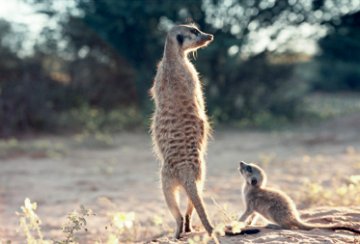Feeding School for Meerkats
Meerkats teach their young how to catch and kill prey such as scorpions and spiders.
Share this:
- Share via email (Opens in new window) Email
- Click to share on Facebook (Opens in new window) Facebook
- Click to share on X (Opens in new window) X
- Click to share on Pinterest (Opens in new window) Pinterest
- Click to share on Reddit (Opens in new window) Reddit
- Share to Google Classroom (Opens in new window) Google Classroom
- Click to print (Opens in new window) Print
By Emily Sohn
Your teachers help you to learn math, spelling, and lots of other things. When you’re done with all that, you might want to study your teachers, too. Scientists are interested in what makes teachers teach, and they’re looking for clues throughout the animal kingdom.
For example, researchers have found that certain types of ants teach each other where to find food (see “Professor Ant”). A new study suggests that meerkats also teach their young about food.
“It’s really important to understand simple forms of teaching if we’re going to understand how human teaching evolved,” says Alex Thornton of the University of Cambridge in England.
 |
|
As it gets older, a young meerkat begging for food is more likely to receive a live meal that it can practice capturing and killing. |
| A. Radford, S. Lanfear, A. Thornton, and K. McAuliffe |
Meerkats are furry little mammals that live in Africa and stand upright, like prairie dogs. You may have seen the cute creatures on the TV show “Meerkat Manor,” which airs on Animal Planet. The stars of this show, along with other meerkat groups living in the Kalahari Desert, took part in experiments conducted by Thornton and coworker Katherine McAuliffe to see if meerkats show some form of teaching.
For teaching to occur, a teacher must do something in front of students that the teacher wouldn’t do if he or she were alone. Also, what the teacher does must cost the teacher something, not in money but in time or energy. Finally, students must learn more quickly from a teacher than they would by themselves.
 |
|
Meerkat pups about 30 days old are ready to go out foraging. |
| A. Radford, S. Lanfear, A. Thornton, and K. McAuliffe |
When pups join hunting groups, they make a lot of noise as they beg for food. In response, the adults catch lizards and other prey, and they give this food to their young. The scientists saw more than 2,000 examples of this behavior.
Sometimes, the adults killed prey before giving it to their young. This guarantees that a pup gets an easy-to-eat meal. Other times, the adults delivered living prey, which has a greater chance of getting away.
One of the study’s findings was that adults give living prey to older pups 90 percent of the time. Younger pups get living prey only 65 percent of the time. This suggests that the adults are giving the pups more and more chances to learn to kill prey for themselves. If the prey escapes, the teacher will catch it again about a quarter of the time and bring it back so that the youngster can try again.
 |
|
An experienced pup, about 70 days old, eats a live scorpion presented by an adult. |
| A. Radford, S. Lanfear, A. Thornton, and K. McAuliffe |
The begging calls of the youngsters seem to affect the behavior of their teachers. When the scientists played the recorded squeaks of young pups during a hunting expedition, the adults killed more prey. When the scientists played the calls of older pups, the adults left more prey alive. In other words, these teachers seem to respond to the needs of their students.
To see if the meerkats were really learning from the process, the researchers fed two groups of pups for 3 days. To one group of young, they gave live, stingless scorpions. The other group ate hard-boiled eggs.
At the end of the experiment, all of the scorpion-trained pups were able to catch and kill a live scorpion by themselves. Only one-third of the egg-eaters managed to grab a scorpion. Practice certainly made a difference.
You may not always like doing homework, but just be glad you don’t have to eat scorpions to keep your grades up!—E. Sohn
Going Deeper:
Milius, Susan. 2006. Live prey for dummies: Meerkats coach pups on hunting. Science News 170(July 15):36. Available at http://www.sciencenews.org/articles/20060715/fob3.asp .
You can learn more about meerkats at en.wikipedia.org/wiki/Meerkat (Wikipedia).
Meerkat Manor has a fan site at animal.discovery.com/fansites/meerkat/meerkat.html (Animal Planet).
Sohn, Emily. 2006. Professor ant. Science News for Kids (Jan. 18). Available at http://www.sciencenewsforkids.org/articles/20060118/Note3.asp .
SciFiZone
Teacher! Teacher!
http://www.sciencenewsforkids.org/articles/20060208/SciFiZone.asp






